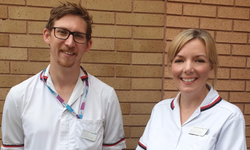
Ms Liz Hodson, Chief Cardiac Physiologist at University Hospitals of Leicester NHS Trust, shares her department's approach to registrar training and the value that cardiac physiologists can bring to the table.
I have worked within my echo department since 2007 and during that time I have seen many registrars come and go. Some have been really keen to get in to echo, others not so much. Regardless of whether these registrars are the echo gurus of tomorrow they all need some degree of both practical and theoretical echo teaching.
For a few years at the beginning of my echo career I sat back and observed how registrar time in echo was always an after-thought from both physiologists and the clinical team alike. Time constraints both on the wards and within the echo department meant that any minuscule of echo teaching offered was often stressful, seen as a burden and lacked any sort of consistency or substance. The inevitable started to happen, fewer and fewer registrars came to echo for teaching, instead choosing to find alternative methods to gain echo knowledge. As a junior member of staff at that time, I personally did not feel that my own knowledge and experience in echo was sufficient to be teaching anyone, let alone a doctor, but what I did know was that the process at that point did not work for anyone.
Fast forward a few years to a time when I had gained in my own confidence and knowledge within the echo field and I started to realise that I really enjoyed teaching others how to scan and imparting the theoretical knowledge I had gained along the way. With the investiture of a new echo clinical lead and with me as the echo rota coordinator at that time, I was asked to reinstate some sort of echo teaching for the registrars.
I considered the things that had not been successful previously and how this could be improved. I decided that the vital factor was time. It is impossible to teach echo to a high standard without offering the trainee time to become familiar with things like various echo machines within the department, the logistics of performing the scan and the generation of a comprehensive set of measurements and report. The second most important factor was consistency. Offering registrar echo sessions once a month or even once a week just wasn’t frequent enough to deliver the standard of echo training required.
With all of this in mind, it was decided that the department would offer a registrar echo training list every afternoon of the week with three outpatients booked at one hour intervals. The sessions would be fully supported by a BSE accredited echo physiologist and the support that was offered would be dependent on the current echo skills of each particular registrar. Some would be able to fly solo with both scanning and reporting, while others would require complete one to one sessions to learn the very basics of scanning and then work their way up, with the majority falling somewhere between the two.
These sessions have evolved beautifully over time and work extremely well for both the registrars and the echo department alike. Relations between the two staff groups have never been better and the learning process works both ways. Working closely with the registrars provides us as physiologists with the opportunity to learn a little more about the clinical assessment of patients and to have the opportunity to review other imaging modalities to help in the overall assessment. It is also very handy to have registrars present in the department for when that inevitable patient turns up for an outpatient echo appointment at 4.30pm on a Friday and is in fast AF!
As this training plan goes from strength to strength, we are now able to offer teaching within the echo department for all cardiology registrars from ST3 level upwards and this is also expanding to incorporate some non cardiology registrars with an interest in echo too. We are able to provide any doctor who would like to go through the BSE accreditation process with a mentor to guide them through exam preparation and video and logbook submission. This process has been met with great positive feedback.
The latest development in our registrar training package is the advent of additional lunchtime echo teaching devised and delivered by myself and my colleague Nick Trim. It is called ‘Tea & Cake Echo Teaching’ and yes, we bribe doctors to attend with homemade cake and a cup of tea. These are informal sessions held twice a month at lunchtime where we cover the theory aspects of echo with supporting case studies. We follow the BSE transthoracic accreditation syllabus and deliver these sessions in short and concise 30-45 minute blocks of teaching. We find that lunchtime works well as individuals can drop in to the teaching between clinics or wards rounds and the lure of cake definitely works!
I do understand that for some departments finding time for registrar training in already busy and oversubscribed schedules can seem like a struggle. However, just a few adjustments to schedules can free up enough time to assist with this type of training. I can also wholeheartedly recommend baking a cake for these sessions as it makes the process a much more pleasurable experience for all concerned!
A version of this article was originally published in ECHO 117, March 2022